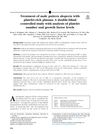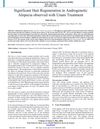 57 citations,
October 2018 in “Journal of The American Academy of Dermatology”
57 citations,
October 2018 in “Journal of The American Academy of Dermatology” Platelet-rich plasma treatment can significantly increase hair count and density in men with pattern baldness, and these improvements can last up to 3 months.
 46 citations,
January 2008 in “Climacteric”
46 citations,
January 2008 in “Climacteric” Testosterone therapy can help improve sexual desire and function in postmenopausal women but may cause side effects and is not FDA-approved for this use.
 37 citations,
February 2014 in “Journal of Dermatology”
37 citations,
February 2014 in “Journal of Dermatology” Valproic acid increases hair count in men with hair loss.
 30 citations,
January 2000 in “Dermatologic Clinics”
30 citations,
January 2000 in “Dermatologic Clinics” Finasteride and minoxidil are effective FDA-approved treatments for androgenetic alopecia.
 28 citations,
July 2011 in “Journal of Plastic Reconstructive and Aesthetic Surgery”
28 citations,
July 2011 in “Journal of Plastic Reconstructive and Aesthetic Surgery” A patient had skin tissue death at the hair removal site after a hair transplant, which was treated with surgery.
 25 citations,
September 2020 in “Molecules”
25 citations,
September 2020 in “Molecules” Quercitrin may help treat hair loss by promoting hair growth and improving cell health.
 24 citations,
May 2017 in “Journal of Cosmetic and Laser Therapy”
24 citations,
May 2017 in “Journal of Cosmetic and Laser Therapy” The laser scanner device was more effective at increasing hair density than the laser hat in treating androgenic alopecia.
 22 citations,
March 2000 in “Clinics in Dermatology”
22 citations,
March 2000 in “Clinics in Dermatology” Many treatments for hair loss lack proper testing and FDA approval, so their effectiveness is uncertain.
 21 citations,
November 2010 in “Talanta”
21 citations,
November 2010 in “Talanta” Researchers developed a reliable method to measure testosterone and epitestosterone in urine for medical and anti-doping use.
 14 citations,
April 2021 in “Biology”
14 citations,
April 2021 in “Biology” Thai rice bran extracts, especially from Tubtim Chumphae rice, can significantly reduce the activity of hair loss genes, with x-tocopherol showing potential as an anti-hair loss product.
 12 citations,
May 2017 in “Medicine”
12 citations,
May 2017 in “Medicine” Oral isotretinoin was recommended for a 21-year-old woman with severe acne.
 9 citations,
September 2019 in “Journal of Cosmetic Dermatology”
9 citations,
September 2019 in “Journal of Cosmetic Dermatology” PRP injections improve hair density in male hair loss.
![Synthesis of Spiro[cyclohexane-1,2'-[2H]indene] Derivatives as Inhibitors of Steroid 5α-Reductase](/images/research/d91300a7-4d66-4d2c-90ac-293b0dbc5ff5/small/21048.jpg) 8 citations,
June 1995 in “Helvetica Chimica Acta”
8 citations,
June 1995 in “Helvetica Chimica Acta” Compound 15a was effective in inhibiting 5α-reductase.
 6 citations,
September 2019 in “Journal of Cosmetic Dermatology”
6 citations,
September 2019 in “Journal of Cosmetic Dermatology” Laser treatment effectively increases hair density and thickness in androgenic alopecia.
 6 citations,
September 2012 in “Clinical Interventions in Aging”
6 citations,
September 2012 in “Clinical Interventions in Aging” Honokiol might help reduce male skin aging by maintaining testosterone levels.
 4 citations,
July 2015 in “Veterinary Dermatology”
4 citations,
July 2015 in “Veterinary Dermatology” Two types of 5α-reductase are in dog skin, which might make dutasteride better than finasteride for treating dog hair loss.
 3 citations,
July 2019 in “Experimental Dermatology”
3 citations,
July 2019 in “Experimental Dermatology” Hair loss patients may have different polyamine levels in various scalp areas.
 3 citations,
January 2010 in “Expert Opinion on Pharmacotherapy”
3 citations,
January 2010 in “Expert Opinion on Pharmacotherapy” No treatment fully stops excessive hair growth in women, but various methods can help manage it effectively.
 2 citations,
September 2007 in “International Journal of Impotence Research”
2 citations,
September 2007 in “International Journal of Impotence Research” Local testosterone treatment improved sexual desire in a female with fragile X syndrome.
 1 citations,
July 2016 in “Prescriber”
1 citations,
July 2016 in “Prescriber” Minoxidil and spironolactone slow hair loss in women.
 November 2024 in “Benha Journal of Applied Sciences”
November 2024 in “Benha Journal of Applied Sciences” Reduced alpha smooth muscle actin may cause hair loss in androgenetic alopecia.

Early detection and comprehensive treatment of PCOS are crucial due to its long-term health impacts and associated risks.
 December 2023 in “Jurnal Penelitian Pendidikan IPA”
December 2023 in “Jurnal Penelitian Pendidikan IPA” PRP heals pockmarked skin better than salmon DNA serum.

PCOS requires personalized treatment to improve life quality and reduce health risks.
 June 2023 in “International journal of science and research”
June 2023 in “International journal of science and research” PRP injections help hair regrowth safely but may need more research.
 February 2023 in “Malaysian Journal of Science. Series B, Physical & Earth Sciences”
February 2023 in “Malaysian Journal of Science. Series B, Physical & Earth Sciences” Analyzing bear poop helps measure their stress without harming them.
 January 2020 in “International Journal of Research”
January 2020 in “International Journal of Research” High testosterone increases heart disease risk in women with PCOS.

The article concludes that better diagnosis and management of Polycystic Ovarian Syndrome are needed to improve women's health and prevent related diseases.
 December 2024 in “Research Square (Research Square)”
December 2024 in “Research Square (Research Square)” Placental stem cell exosome therapy improves hair growth and reduces hair loss.
 May 2024 in “International journal of science and research”
May 2024 in “International journal of science and research” Unani treatment significantly regrows hair in young adults with androgenetic alopecia.












![Synthesis of Spiro[cyclohexane-1,2'-[2H]indene] Derivatives as Inhibitors of Steroid 5α-Reductase](/images/research/d91300a7-4d66-4d2c-90ac-293b0dbc5ff5/small/21048.jpg)
















